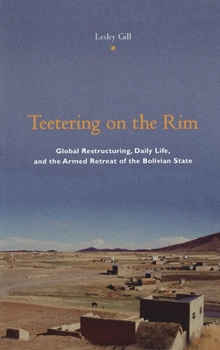Teetering on the Rim: Global Restructuring, Daily Life, and the Armed Retreat of the Bolivian State
Select Format
Select Condition 
Book Overview
Focusing on an impoverished city on the periphery of La Paz, the Bolivian capital, Gill examines the ways in which neoliberal policies reorder social relations among poor men and women -- and between them and the state.
Format:Hardcover
Language:English
ISBN:023111804X
ISBN13:9780231118040
Release Date:May 2000
Publisher:Columbia University Press
Length:288 Pages
Weight:0.95 lbs.
Dimensions:0.7" x 6.2" x 9.3"
Grade Range:Postsecondary and higher
Customer Reviews
1 rating
The Country That Wants to Exist
Published by Thriftbooks.com User , 20 years ago
Eduardo Galeano calls Bolivia "the country that wants to exist." This is an apt description of a country whose history, consistently since Spanish colonial times, is characterized by a tradition of exploitation and a people struggling for equality. As current events in La Paz and its poor sister, El Alto, demonstrate, exploitative government policies are being met with massive popular resistance. Gill details a tragic confluence of circumstances and the resulting misery for and action by poor Bolivians. External pressure by the U.S., World Bank, and the IMF on Bolivia for neoliberal economic reform, coupled with the proliferation of nongovernmental organizations (NGOs) to allow the state to withdraw from its basic obligations to the Bolivian people. Because of the inherent instability of political power in Bolivia and its dependent position to stronger countries, this "different type of conquistador, the well-dressed officials of the World Bank and IMF," has been able to force continued compliance of these reforms, even though evidence has not substantiated that the life of the average Bolivian is improving. Certainly governance is not any more stable than at the start of neoliberalism in the mid-1980s. Gill refutes the neoliberal model as a path to economic stability and fairness in Bolivia. The Washington Consensus would have one view everything through a positivist lens, but that obscures the struggle, competition, and uncertain living conditions that characterize much of the Bolivian experience. Gill uses a set of vehicles for illustrating the state of living conditions and the modes of social organization, which are themselves vehicles for quantifying the retreat of the Bolivian state. In terms of living conditions, Gill takes particular note of the state of health care, the housing crisis, the quality and availability of education, new and evolving forms of social and economic competition, and what she views as exploitative neoliberal welfare programs, such as Food-for-Work and microcredit schemes. In terms of social organization, Gill emphasizes the corruption and distrust of government, the heightened role of the government, the decline of the miner as political force and the subsequent rise of the teacher, and the proliferation of NGOs in Bolivia. Gill focuses on the lives of Altenos as affected by the larger situation in Bolivia. While Bolivian politicians were eagerly complying with IMF/World Bank restructuring programs, they attempted to reduce the individuals within the state to numbers in a problem that could be solved through formulaic means. For example, the programs of the New Economic Policy launched by President Paz in 1985 were tools for the state to reassert control over a shattered economy and to return capacity to state institutions. Although Paz's shock therapy did stem hyper- inflation, the closure of mines dislocated tens of thousands of miners who had no guarantee of security. These miners and their familie





